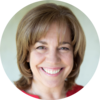At the end of 2019, I wrote an article about planning for the next 20 years, starting with 2020. I wrote, “I want 20/20 vision for a 2020 vision, clearly and deliberately crafting what the future holds.”
I was way off.
Planning is not the territory you are walking upon. Planning is a mental representation of what you are predicting will happen. Predictions fail. That’s easy to see in the extraordinary year that was 2020. But it actually holds true for every single year … every single day … and every single moment.
Our brains are future-predictors, making constant judgments about what will happen next and what this physical body has to do now to respond to that prediction. The prediction is not reality. It’s our best guess about what the unfolding time will bring. Most times, our predictions are pretty close to what does happen, so we think life is predictable.
It’s not.
Planning is not useless. It’s just that we tend to cling to our plans as if they are the reality we are living into. It took me a while, for example, to come to the realization that the second immersion for our foundation course, the Certificate in Wholebeing Positive Psychology, had to be virtual. Then, that same tangle happened again when I realized the next cohort had to be completely virtual.
I threw away the plans to have on-site immersions. We all learned to adapt. We had to. And it turned out that the virtual experience was incredibly effective and transformational. It was amazing—and so satisfying to meet reality as it is and say, Okay, if this is the way it really is, versus how I want it to be, what needs to change?
The longer I hold onto the plan in my head of what should be, the more anxiety I feel. The sooner I’m able to pivot to the truth of the situation, the clearer I am.
To stay sane, it helps to know when the plan needs to be tossed. Kenny Roger’s song “The Gambler” gives great advice on plans (and on cards), “You’ve got to know when to hold ’em. Know when to fold ’em. Know when to walk away. And know when to run.”
So if life is inherently uncertain, and does not always conform to predictions and plans, what can we be sure of? How can we feel grounded, stable, and secure even when the external circumstances are anything but?
When I reread my article on my 2020 vision, I saw in retrospect what was most helpful in the planning process (and in life). It’s answering this question:
What is the theme of the plan?
Not the specific calendar of events. Not the goal of sales, production, or any other metric of success. What is the big idea that overarches every goal, metric, and tactic?
I wrote in that 2019 article: “Next year, I’m dedicating my work to leadership—teaching, writing, and elevating the choice to lead self and others towards our highest and best.”
I called that theme The Choice to Lead.
My actual 12-month plan was completely wrong. But that theme was spot-on. I lived into that theme early on during COVID. New York City was shutting down, people were isolating and fearful, and I knew we had the knowledge, skills, and community that could help. With the leadership of WBI’s Phoebe Atkinson and Caroline Kohles of the Manhattan JCC, our community dove into daily webinars teaching the science of resilience, well-being, relationships, and more, as we applied the evidence-based skills of positive psychology to the new pandemic norm.
The choice to lead ended up not being about teaching leadership, but about living into it, as we explored how best to serve and what was needed given the terrain we were traversing.
What value, theme, or overarching idea have you been living into over the past year, even as your best-laid plans fell apart?
I had a conversation last week with Nicole Rafferty of Ultimate Kronos Group, a company dedicated to Human Resource services. I asked her how her 2020 unfolded. Her usual work was calling on HR departments to sell them products and services, but last year, she told her boss that it just wasn’t the right time to sell anything. HR professionals were working in incredibly stressful situations; instead of selling, she needed to support them. Nicole’s “sales” calls began to look like support calls, asking what they needed and how she could help, and wishing them well. After many of these conversations, she understood how she could serve. She started a podcast called Inspiring People to give them the information they needed, the community they craved, and the time to decompress with peers that was hard to find in the daily chaos of work.
I was proud to be a guest on her podcast recently.
Nicole’s 2020 sales plan did not turn out as expected. But she lived into her theme of “sales as service” in a much bigger way.
In my 2020 vision, I predicted that The Choice to Lead would be my theme for the next 20 years. I’m sticking with that prediction.

Megan McDonough
As the founder of Wholebeing Institute, Megan McDonough leads with divergent thinking and creative perspectives to build organizations and networks that harness the best in people for the greatest good. She has decades of leadership experience in diverse settings, in roles ranging from Alliance Manager at DuPont; to General Manager of RISE at Kripalu, the largest yoga retreat center in North America; to numerous online-learning startups. A yoga enthusiast, Megan has practiced for more than 20 years and taught for more than a decade, and brings that mindfulness practice to managing stress. Her degree in biology, natural science, and nuclear medicine, along with in-depth work in positive psychology, informs her evidence-based approach to thriving. She is the award-winning author of four books on living mindfully, and is the lead faculty for the Certificate in Wholebeing Positive Psychology.


